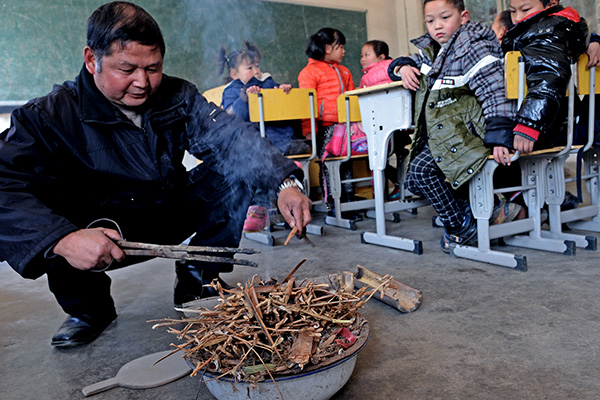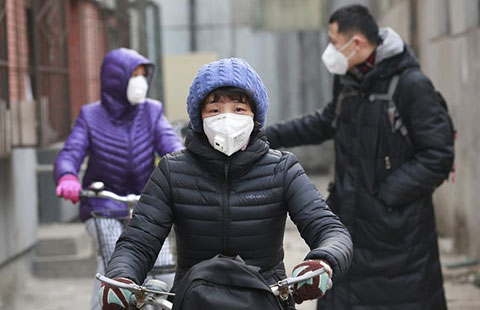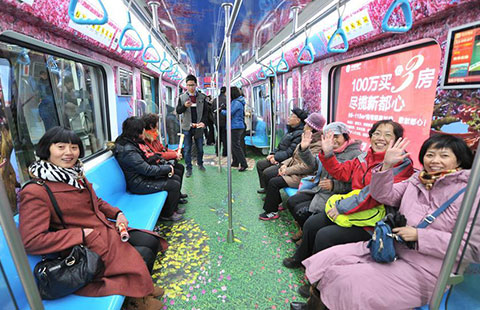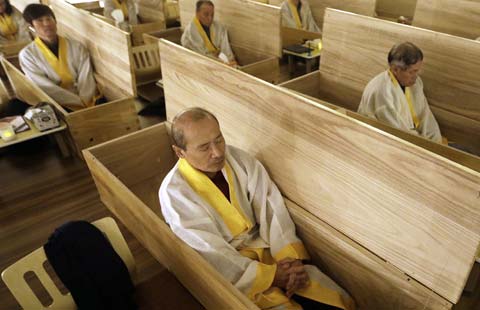

 |
|
A teacher burns twigs and leaves to heat a classroom in Nanchang, Jiangxi, a province south of the Huaihe River. WAN XIANG/XINHUA |
However, the extra winter load on power stations in the north exacerbates the already high levels of airborne pollution. Since November, large parts of North China have frequently been shrouded in choking smog, caused in part by the low-quality coal that remains the major source of power generation.
Earlier this month, Baoding, Hebei province, recorded levels of PM2.5 - particulate matter with a diameter of less than 2.5 microns, so small it can penetrate the lungs and enter the bloodstream - of about 1,000 micrograms per cu m. The World Health Organization's safe level is 30 mg per cu m.
Since Beijing's heating plants began operations in mid-November, the city has twice been forced to issue red alerts for smog, the first in the capital's history. The average PM 2.5 reading has been 241, more than three times the national safety level. Moreover, restrictions have been imposed on the use of cars, schools have been closed and sales of protective air filter masks have soared.
The lack of central heating means pollution levels are generally lower in the south of the country, where only the 14 coldest cities and provinces require extra heating for sustained periods of time, according to the Energy-Efficient Buildings Research Center at Tsinghua University in Beijing.
Shao Qing, deputy general manager of Agile Property Holdings in Nanjing, one of the city's main real estate developers, said many developers refuse to install central heating equipment because of the high cost.
"Irrespective of whether you are equipping new buildings with central heating pipelines, or installing heating systems in older buildings, it costs a lot," she said. "Of course, in the final analysis the cost will be borne by the customers."
Compared with houses and apartments in the north, those in the south are not fitted with double-glazing or an extra layer of insulating material on the exterior walls to prevent heat from escaping, according to Shao.
Failed attempts
Several moves to provide widespread central heating in the south have been unsucc-essful. As early as 2005, Wuhan, Hubei province, proposed providing central heating to 1.6 million people living within the city's 500 square kilometers, leading to a number of communities being equipped with central heating.
For several years, residents enjoyed comfortable winters, but in 2012, Qiu Baoxing, the then-deputy minister of the Ministry of Housing and Urban-Rural Development, criticized the move, saying it "posed a great danger to energy consumption". Qiu also warned that the city would be stripped of its honorary titles if it refused to reverse the decision. In response, work reports from several southern cities have stated that central heating will not be provided in the downtown areas.
Mei Peimin, director of the Department of Energy Saving and Use at the Nanjing Economy and Information Technology Commission, said the city's measures to control coal consumption mean heating is only provided to industrial enterprises and nearby residential properties.
"Coal-fired power plants and boilers have become the city's main sources of air pollution," Mei said. "We allow communities near power plants to have central heating, but no such plans have been made for residents in the downtown area. The cost of the central heating infrastructure would be enormous in Nanjing, a city with a population of 8 million. It wouldn't be worth the cost or effort to introduce central heating."
Ye Bin, deputy director of the Nanjing City Planning Bureau, said a lack of resources means it is not possible to install central heating systems. "Some industrial enterprises in Nanjing are only allowed a limited amount of electricity in summer," he said. "The measure was imposed to guarantee that there would be sufficient electricity for residents to use air conditioners. If central heating were adopted, the city's energy consumption would soar."
According to the Ministry of Housing and Urban-Rural Development, the use of central heating is not encouraged in the south. The ministry said many factors must be considered before cities launch central heating projects, and the need for heating should not override other factors, such as controlling air pollution.
"Given the limited number of days when heating is needed, and that temperatures vary in the south ... all methods of heating should be chosen scientifically," the ministry said in a public statement. "Scatt-ered and regional heating methods should be adopted to meet individual needs." The statement said "scattered and regional heating methods" include air conditioners, radiant floor heating and solar devices, and specified that clean and renewable energy projects should be encouraged.
"Small generators powered by natural gas are recomm-ended. In the first pilot program in Hangzhou, four generators manage to provide enough power for electricity, heating and 24-hour hot water in three office buildings with a combined area of 10,000 sq m," Zhao, of Hangzhou Natural Gas, said.
"It costs a lot more to install and equip small gas-powered generators, but in the long run, they are cheaper to use and far more environmentally friendly."
Contact the writer at cangwei@chinadaily.com.cn













